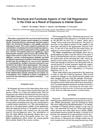Search
for
Sort by
Research
480-510 / 1000+ resultsresearch The Functional Organization of Cutaneous Low-Threshold Mechanosensory Neurons
Different hair follicles in the skin are innervated by unique combinations of mechanosensory neurons, crucial for touch sensation.

research Biomaterials Functionalized with MSC Secreted Extracellular Vesicles and Soluble Factors for Tissue Regeneration
Biomaterials with MSC-derived substances could improve tissue repair and have advantages over direct cell therapy.

research Fully Functional Hair Follicle Regeneration Through the Rearrangement of Stem Cells and Their Niches
Regenerated fully functional hair follicles using stem cells, with potential for hair regrowth therapy.

research The Functional Diversity of Epidermal Keratins Revealed by the Partial Rescue of the Keratin 14 Null Phenotype by Keratin 16
K16 can partially replace K14 but causes hair loss and skin issues.

research Green Regenerative Hydrogel Wound Dressing Functionalized by Natural Drug-Food Homologous Small Molecule Self-Assembled Nanospheres
The new hydrogel dressing with natural molecules helps heal wounds faster and improves skin repair.
research Fabrication of Electrospun Probiotic Functionalized Nanocomposite Scaffolds for Infection Control and Dermal Burn Healing in a Mice Model
Probiotic nanoscaffolds significantly improved burn healing and infection control in mice.

research The Functional Relevance of the Type 1 Cytokines IFN-γ and IL-2 in Alopecia Areata of C3H/HeJ Mice
IFN-γ and IL-2 are important for T cell activation in hair loss in mice.
research Innovative Functional Biomaterials as Therapeutic Wound Dressings for Chronic Diabetic Foot Ulcers
Innovative biomaterials show promise in healing chronic diabetic foot ulcers.

research A Functional Polymorphism in Interleukin-1α (IL1A) Gene Is Associated with Risk of Alopecia Areata in Chinese Populations
A certain genetic variation in the IL1A gene may lower the risk of a hair loss condition in Chinese people.

research Molecular Functional Analyses Revealed Essential Roles of HSP90 and Lamin A/C in Growth, Migration, and Self-Aggregation of Dermal Papilla Cells
HSP90 and lamin A/C are crucial for hair growth and could be targets for treating hair loss.

research Probiotic-Functionalized Silk Fibroin/Sodium Alginate Scaffolds With Endoplasmic Reticulum Stress-Relieving Properties For Promoted Scarless Wound Healing
Probiotic-coated silk/alginate scaffolds help heal wounds faster and with less scarring.

research Fully Functional Salivary Gland Regeneration as a Next-Generation Regenerative Therapy
Scientists developed a method to regenerate salivary glands using stem cells.
research Epidermis-Specific Ablation of Claudin-1 in Adult Mice Demonstrates the Essential Role of a Tight Junction Barrier in Skin Homeostasis
Claudin-1 is crucial for maintaining skin barrier and preventing inflammation.

research Functional Evaluation of Novel CYP21A2 Variants: Expanding the Genetic Basis of Non-Classic CAH
Certain genetic variants reduce enzyme activity, contributing to non-classic congenital adrenal hyperplasia.

research Functional Evaluation of Novel CYP21A2 Variants: Expanding the Genetic Basis of Non-Classic Congenital Adrenal Hyperplasia
Certain genetic variants impair enzyme activity, contributing to non-classic congenital adrenal hyperplasia.

research A Bio-Functional Wnt3a Gradient Microarray for Cell Niche Studies
The study created a tool that mimics natural cell signals, which increased cell growth and could help with hair regeneration research.

research Functional Roles of Krox20 (Egr2) in Epithelial Stem Cells
Krox20 (Egr2) is important for the function of epithelial stem cells.

research Effect of Ginsenoside Rd on Dermal-Epidermal Junction in Fibroblast
Ginsenoside Rd may help improve skin aging by increasing collagen in the skin.
research Functional Annotation of Genes Underlying Hair Disorders
The study identified key genes and pathways linked to hair disorders, aiding precision medicine.

research Perceived Functional Impact of Abnormal Facial Appearance
People with facial disfigurements are judged more negatively, highlighting the social benefits of corrective surgery.
research A Concise Review on Tissue Engineered Artificial Skin Grafts for Chronic Wound Treatment: Can We Reconstruct Functional Skin Tissue In Vitro?
Creating fully functional artificial skin for chronic wounds is still very challenging.
research Molecular and Functional Aspects of the Hairless (Hr) Gene in Laboratory Rodents and Humans
The hr gene is crucial for skin and hair health, with mutations causing hair disorders.

research Cloning of a Functional Vitamin D Receptor from the Lamprey, an Ancient Vertebrate Lacking a Calcified Skeleton and Teeth
Lampreys have a functional vitamin D receptor that may help detoxify harmful substances.
research New Aspects of Galectin Functionality in Nuclei of Cultured Bone Marrow Stromal and Epidermal Cells: Biotinylated Galectins as a Tool to Detect Specific Binding Sites
Galectin-1 helps in RNA processing in cell nuclei.

research N-Terminal Functional Domain of Gasdermin A3 Regulates Mitochondrial Homeostasis via Mitochondrial Targeting
Mutations in Gasdermin A3 cause skin inflammation and hair loss by disrupting mitochondria.

research Prevalence of Functional Disorders of Androgen Excess in Unselected Premenopausal Women: A Study in Blood Donors
Many young women who donate blood have hormonal disorders like excess male hormones and PCOS.

research The Structural and Functional Aspects of Hair Cell Regeneration in the Chick as a Result of Exposure to Intense Sound
Chickens exposed to loud noise can quickly regain hearing mostly due to repair of the tectorial membrane, not just hair cell regeneration.
research In Vivo Expansion and Regeneration of Full-Thickness Functional Skin with an Autologous Homologous Skin Construct: Clinical Proof of Concept for Chronic Wound Healing
A new skin treatment using a patient's own cells healed chronic wounds effectively and was preferred over traditional grafts.

research Oncogenic Senescence: A Multi-Functional Perspective
Cellular senescence has both cancer-blocking and cancer-promoting effects, and targeting senescent cells may improve health and lifespan.